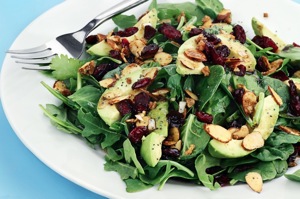
Anyone concerned with health and wellness has heard about the gluten-free diet. Eliminating gluten is critical for those who have celiac disease or non-celiac gluten sensitivity. What many gluten-free newcomers don't realize is that many common gluten-free foods contain ingredients that just promote a different set of health problems. In this article we'll discuss how to avoid this common pitfall so you can transition more easily to a healthy gluten-free diet.
The hidden risk in going gluten-free
Many people rely on packaged and prepared foods for the bulk of their diet, such as breads, pastas, crackers, sauces, and mixes. The tendency when going gluten-free is to replace those items with gluten-free versions of the same products. When you look at the label for packaged gluten-free products, however, you will see ingredients such as rice flour, tapioca starch, corn starch, and potato starch, plus a load of unhealthy fats.
Though free of gluten, these highly-processed, high-sugar, high-carb, low-fiber ingredients can contribute to blood sugar imbalances that affect weight gain, mood, brain function, and other aspects of health. Many of these processed foods also lack vital minerals and nutrients, which over time can contribute to micronutrient deficiencies. Overall, the general lack of nutritional density of packaged gluten-free products outweighs their convenience.
Variety, nutrient density, and whole foods key in healthy gluten-free diet When choosing to go gluten-free, keep in mind the basis for any truly health-supporting diet: simple, fresh, whole foods that are as close to their original state as possible. The more processed a food is, the less it has to offer your body in the way of nutrition and health.
Variety and high nutrient-density foods are key for long-term health; a diet of only cheese and rice pasta won't make you much healthier than your former gluten-laden diet did. When you're craving the comfort of carbs, go for a baked sweet potato instead of bread. Curb cravings by eating a diet heavy in fresh vegetables and modest amounts of fruit (so as not to imbalance blood sugar). You may need to retool your eating habits but you will be amply rewarded with significant improvements in how you feel and function.
A smart transition to a healthy gluten-free diet
Although any major dietary change is challenging, a healthy switch to a gluten-free diet can be easy and rewarding with some mindful lifestyle habits. Below are some tips to help with the transition:
1. Learn to read and understand nutrition fact labels
You will quickly develop an eye for those low-nutrient, highly processed ingredients, and learn what products contain them. These should never, or rarely, be in your grocery cart. Also, learn which common ingredients have hidden gluten in them, and eliminate them from your kitchen.
2. Make whole, unprocessed foods the bulk of your diet
Whole, unprocessed foods are the foundation for any diet that supports long-term health and wellness. Avoid the packaged food aisles, make friends with the bulk and produce departments, shop your local farmer's market, and if you don't already cook at home…
3. Learn to cook from scratch
– Cooking from scratch can be satisfying, easy and very rewarding
– Cooking at home means you know what's in your food, and you can more successfully avoid gluten cross-contamination
– Batch cooking meals that you can refrigerate or freeze and re-heat makes it much easier
– A crock pot, blender, and food processor are very useful for making big-batch meals ahead of time
– Many fabulous blogs are devoted to healthy gluten-free home cooking
4. Mindfulness at the grocery store
When you pick up a package of processed gluten-free food, ask yourself if you'd normally eat it, or if you're picking it up just because it says "gluten-free." You may find yourself putting a lot of things back… especially if you look at the nutrition label!
5. Commitment
Remember every day why you have chosen to go gluten-free; you are honoring your own body and long-term health by making a positive choice. Stick with it!



Latest from the Blog
The Death of Red Dye #3
January 15, 2025What Is Red Dye No. 3? Red Dye No. 3, or Erythrosine, is a synthetic food color derived from coal tar. It was first approved by the FDA in the 1950s and quickly became one of the most popular artificial colors in food and cosmetics. Red Dye No. 3 was used in everything from candies, […] Read more
Latest from the Blog
Do You Know What Is In Your Protein Powder?
What’s Really in Your Protein Powder? Understanding the Risks Protein powders are a staple in many health-conscious diets, from athletes seeking muscle recovery to those simply aiming to boost their daily protein intake. With a wide variety of options available, choosing the right one can feel overwhelming. However, recent findings have raised concerns about what’s […] Read more